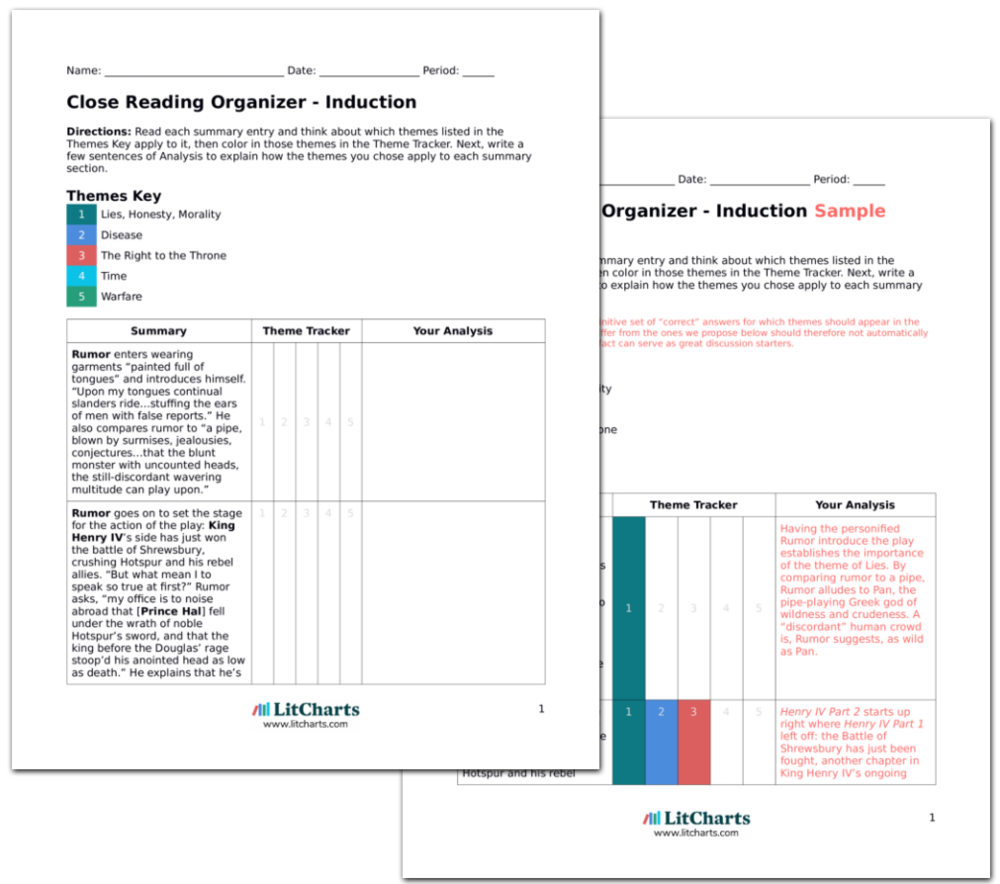

Cheerfully, he adds to his offenses: he is one who engages in robbery by night and thus goes "by the moon," not by Phoebus the sun. Moreover, only a superior wit could accomplish all this in such an adroit way, effectively answering what may well be a serious indictment of his character. Here, demonstrating for the first of many times his upper-class learning, he provides a brilliant rhetorical commentary on gross reality and, as always, is fully aware of what he is doing. Is his way of life unknightly, ignoring as he does noblesse oblige, the obligations of rank? Well, let Hal remember that Falstaff "takes purses by moonlight" and thus does not follow "Phoebus, he, 'that wand'ring knight so fair'" (16-17).

Quite an indictment, and one which Falstaff does not refute: "Indeed, you come near me now, Hal," he replies (14). Add to all this Falstaff's alleged interest in bawds and houses of prostitution. Time, a symbol of the ordered life as used here, could not possibly concern one whose hours are spent largely in drinking sack (a strong sherry-type wine, especially popular in the days before gin and whiskey), overeating, and wasting half the day in sleep induced by gluttony. If, for the moment, we take literally what Hal says about him in his first speech (213), Falstaff emerges as one devoid of any sense of responsibility. What is learned about Falstaff as he exchanges spontaneous, good-natured insults with the prince? He is, to be sure, a knight of the realm, apparently a not unfitting associate of the prince, whom he meets now, not in a disreputable tavern but in the prince's London apartment. Hal, and even Poins, uses the same general style, which provides a significant contrast to that used, for example, by the lowly carriers in Act II, Scene 1.īut most important in this scene are the characters of Falstaff and Prince Hal. Sir John here, and throughout the play, is a speaker of superior prose, prose marked by a vivacity, brilliance, and finish evidenced from the very beginning in his first two speeches with their balance, antitheses, and allusive elements. Occasional vulgarisms in the man-to-man exchange between Falstaff and Hal should not mislead the reader. But one should note that, colloquial though it is predominantly, it is the prose of upper-class, sophisticated speakers. He makes it clear that he is fully aware of the character of his chosen companions, likening them to "contagious clouds." He states that he chooses for a time to remain in their riotous company for recreation's sake but will, at the right moment, surprise and gratify the world by standing forth in his true character.Īppropriately, prose is the medium used in this first scene of the broadly comic subplot wherein matters of state have no immediate place. Left alone, the prince now soliloquizes in blank verse. Prince Hal cannot resist such a good chance to trick his old companion he will take part in the robbery at Gadshill.Īll the dialogue so far has been in prose. The great sport will be to expose Falstaff as a coward and liar. Let Sir John, Bardolph, and Peto rob the travelers then Hal and Poins, disguised, will rob the robbers. After Falstaff has departed, the prince learns from Poins that the robbery will provide a wonderful opportunity to gull Falstaff. First he refuses to go along with the others even "for recreation sake" then, after listening to Falstaff's denunciation of him, he changes his mind and finally he refuses once more to be one of the thieves at Gadshill. Hal amuses himself at Falstaff's expense.

Since the subject of robbery has been introduced prior to the arrival of Poins, the way has been prepared for details about the Gadshill enterprise in which Hal and Falstaff are asked to participate. But Falstaff matches him in rebuttal indeed, some critics argue that the fat knight excels him. Hal, whose initial speech provides a full-length portrait of the knight as a glutton and lecher who is too "fat-witted" to be concerned about the time of day, proves to be a rather worthy opponent in this combat of wits. Falstaff shows little deference for the prince, twitting him about his lack of grace and his devil-may-care attitude and behavior. The two vie with each other in trading amusing insults. The subject of this discourse ranges from drinking to purse-snatching. Prince Hal, far from engaging enemies of the Crown in armed combat, is amusing himself in witty verbal exchange with Falstaff. The action now shifts to the prince's apartment in London, and the participants are Prince Hal himself, Sir John Falstaff, and Poins.


 0 kommentar(er)
0 kommentar(er)
